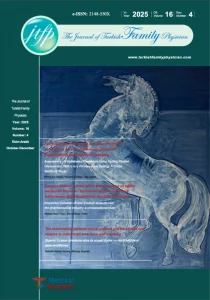Sleep quality level and sleep hygiene in medical students
Introduction and Aim: Sleep quality is an important determinant of general health and daily functionality and is affected by many factors, including sleep hygiene. Sleep hygiene, on the other hand, is the collection of environmental factors, habits, and practices conductive to the person’s sleep for the right amount of time and quality. This study aimed to evaluate sleep quality and its determinants in medical students.
Methods: The data of this descriptive study were collected at Marmara University Faculty of Medicine in January-February 2020. Medical students from Term 2 and Term 5 were included in the study. The data collection form consisted of 37 questions about individual characteristics, behaviors affecting sleep hygiene and sleep quality. The sleep quality level of the participants was evaluated with the Pittsburgh Sleep Quality Index (PSQI). The chi-square test, Fisher’s exact test, and Spearman’s rank correlation coefficient were used in data analysis.
Results: Of the participants, 66.9% (n=107) had poor sleep quality. Among the behaviors that negatively affect sleep hygiene, the most common ones were ‘using a mobile phone/tablet computer in bed’ (‘always’ 26.3%, ‘often’ 46.3%), ‘thinking about daily problems and anxious situations in bed’ (‘always’ 13.1%, ‘often’ %30.0%), and ‘sleeping and waking up at different times during the week’ (‘always’ 8.1%, ‘often’ 31.9%). Statistically significant correlations were found between PSQI total score and ‘thinking about daily problems and anxious situations in bed’, ‘sleeping and waking up at different times during the week’, ‘consuming caffeine within four hours before going to bed’, and ‘using a mobile phone/tablet computer in bed’ (rho=0.404, rho=0.334, rho=0.180, and rho=0.169 respectively; p<0.05 for all).
Conclusion: It was observed that the frequency of poor sleep quality is high among students, and behaviors that negatively affected sleep hygiene decreased the level of sleep quality. Effective guidance practices that will create lifestyle changes to increase sleep quality and improve sleep hygiene in university students are required.



